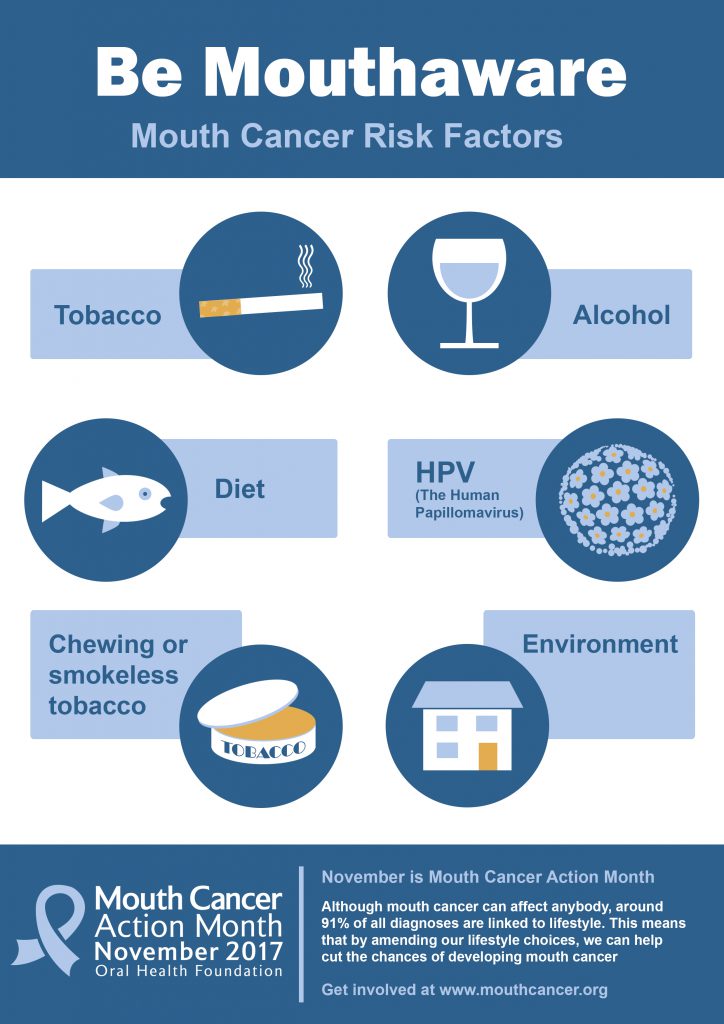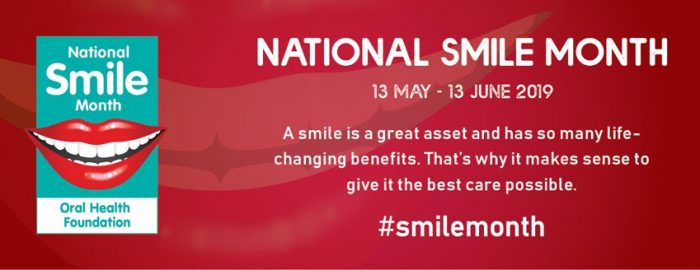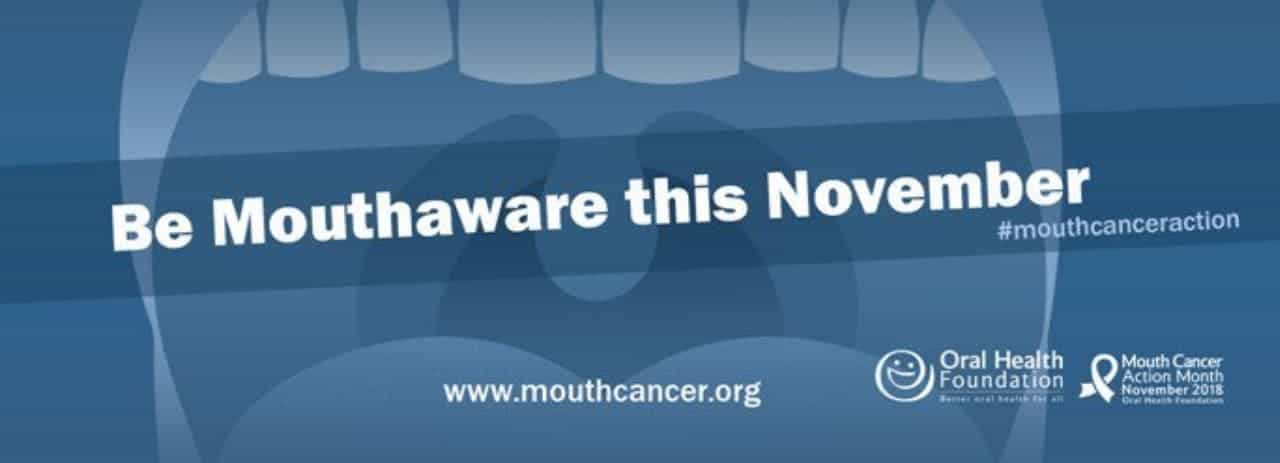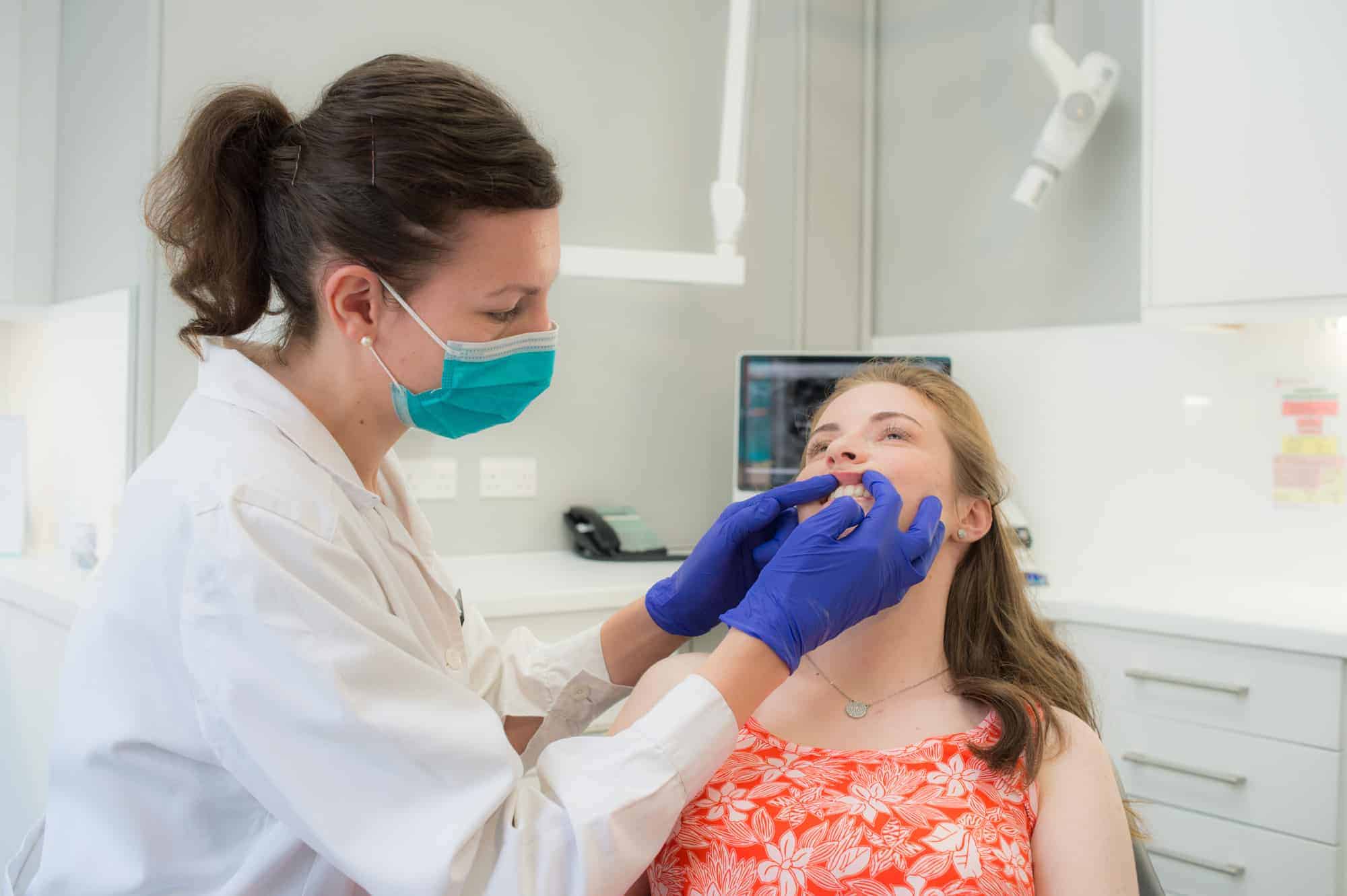Tag: dental
With November being Mouth Cancer Awareness month, it is important to highlight the signs and symptoms of mouth cancer.
During a dental appointment, your dentist will naturally look for abnormalities within the mouth and these include signs of oral cancer. It is important that in between dental appointments you also take notice of what is going on inside your mouth. If you notice any changes is it essential you tell your dentist or doctor immediately.
Mouth cancer can develop in most parts of the mouth, including the lips, tongue, gums, cheek and the throat. If it is caught early, the chances of surviving mouth cancer are nine out of ten – those odds are pretty good, and that’s why early detection is so important.
– If in doubt, get checked out.
It can be hard to spot symptoms of mouth cancer, which is why it is important to regularly attend your dental appointments. Your dentist can perform a check-up and look for slight abnormalities that you might otherwise miss. If anything is found, your dentist will provide onward referral to a specialist for further investigation.
Given that early detection is so crucial for survival, it’s extremely important that we all know what to look out for. In between dental appointments you should look out for changes in your mouth health that could indicate mouth cancer.
Signs & Symptoms of Mouth Cancer:
Three signs and symptoms not to ignore are:
- Ulcers which do not heal within three weeks.
- Red and white patches in the mouth; or
- Unusual lumps or swellings in the mouth or head and neck area.
If you notice anything unusual in your mouth, it’s advisable to make an appointment with your dentist.
Checking for Mouth Cancer:
When checking for signs of mouth cancer you should follow the following routine:
Head and neck
Check if both sides look the same and search for any lumps, bumps or swellings that are only on one side of the face. Feel and press along the sides and front of your neck being alert to any tenderness or lumps to the touch.
Lips
Pull down your lower lip and look inside for any sores or changes in colour. Use your thumb and forefinger to feel the lip for any unusual lumps, bumps or changes in texture. Repeat this on the upper lip.
Cheek
Use your finger to pull out your cheek so that they can see inside. Look for red, white or dark patches.
Then place your index finger inside your cheek, with your opposing thumb on the outside gently squeeze and roll the cheek to check for any lumps, tenderness or ulcers, repeat this action on the other cheek.
The roof of the mouth
With your head tilted back and mouth open wide, your dentist will look to see if there are any lumps or if there is any change in colour. They will run their finger on the roof of your mouth to feel for any lumps.
Tongue
Examine your tongue, looking at the surface for any changes in colour or texture.
Stick out your tongue or move it from one side to another, again looking for any swelling, change in colour or ulcers. Finally, take a look at the underside of the tongue by placing the tip of your tongue on the roof of your mouth.
The floor of the mouth
Look at the floor of the mouth for changes in colour that are different than normal. Press your finger along the floor of your mouth and underside of your tongue to feel for any unusual lumps, swellings or ulcers.
If you find anything unusual in any of these areas, or are unsure of anything, visit your dentist or doctor as soon as possible.
The best ways to prevent mouth cancer:
- Cut down on alcohol consumption;
- Cut down or stop smoking;
- Getting the HPV vaccine, Gardasil 9; and
- Enjoy a healthy diet.

You can book a dental appointment with Temple Dental.
National Smile Month is a UK campaign to promote good oral health.
Fleet Street Clinic is proud to be supporting this great campaign.
Dr Pilar Gesto, one of our highly-qualified dentists, explains why good oral health is key…
“In our busy and sometimes stressful lives, it is common to forget the power of a smile. This simple gesture can affect our work, our social life and our love life. But don’t worry. Beautiful smiles all have one thing in common: they always come from healthy mouths!”

To achieve a healthy and beautiful smile, simply follow the straightforward advice below:
- Clean and floss your teeth after every meal.
- Visit your dentist for regular check-ups.
- Avoid too much food and drinks that may stain your teeth, such as coffee and red wine.
- Do not smoke.
- Do not use abrasive toothpaste or products that may damage your enamel, such as sticky foods and acidic diet.
- In some cases, a whitening treatment may be appropriate if recommended by your dentist.
- Most importantly: smile as widely as you can!
November is Mouth Cancer Awareness Month, and Fleet Street Clinic has collaborated with the charity campaign MouthCancer.org to help raise awareness of the disease.
For more information about Mouth Cancer, you can read the Q&A’s below.
What is Mouth cancer?
Mouth cancer relates to cancer found in the lips, tongue, cheek and throat.
There are, on average, almost 7,800 new cases of mouth cancer diagnosed in the UK each year. The number of new cases of mouth cancer is on the increase, and in the UK has increased by over half in the last decade alone.
Who is at risk?
Mouth cancer is twice as common in men than in women, though an increasing number of women are being diagnosed with the disease. Age is a factor, with people over the age of 40 more likely to be diagnosed, though more young people are now being affected than previously.
People with mouth cancer are more likely to die than those having cervical cancer or melanoma skin cancer. Prognosis is good if the disease is caught early.
What can cause mouth cancer?
Although mouth cancer can affect anybody, around 91% of all diagnoses are linked to lifestyle. This means that by amending our lifestyle choices, we can help cut the chances of developing mouth cancer.
There are many known contributors to mouth cancer:
- Tobacco
- Alcohol
Many cases of mouth cancer are linked to tobacco and alcohol.
If tobacco and alcohol are consumed together the risk is even greater.
- Over-exposure to sunlight can also increase the risk of cancer of the lips.
- Poor diet is linked to a third of all cancer cases. Book a Dietitian Consultation
- Experts suggest the Human Papilloma Virus (HPV), transmitted through oral sex, could overtake tobacco and alcohol as the main risk factor within the coming decade. Book Your HPV Vaccine
What is the link between HPV and cancer?
There’s growing evidence that an increasing proportion of cancer is caused by HPV infection in the mouth. Around 1 in 4 mouth cancers and 1 in 3 throat cancers are HPV-related, but in younger patients, most throat cancers are now HPV-related.
HPV doesn’t directly give you cancer, but it causes changes in the cells it’s infected (for example, in the throat or cervix) and these cells can then become cancerous.
The HPV vaccine, Gardasil 9 is available at Fleet Street Clinic for both girls and boys. The vaccine was developed to fight cervical cancer, but it is likely that it’ll also help to reduce the rates of mouth cancer.
It is advisable to give the HPV vaccine before sexual activity starts to get the best protection. The underlying principle being there has been no exposure to any HPV strains yet. You can, however, receive the vaccination later on in life, this is down to personal choice. We’d recommend a GP consultation to discuss the HPV vaccine prior to booking.
More information on Gardasil 9.
What are the signs of mouth cancer?
Mouth cancer can appear in different forms and can affect all parts of the mouth, tongue and lips. Symptoms of mouth cancer include:
- A painless mouth ulcer that does not heal normally
- White or red patch in the mouth or on the tongue
- Any unusual lumps or swellings that linger
- 1 or more mouth ulcers that don’t heal after 3 weeks
- Pain when swallowing
- A feeling as though something’s stuck in your throat
Be mouth aware and look for changes in the mouth:
It is important to visit your dentist or your GP if these areas do not heal within three weeks.
How can mouth cancer be detected early?
Mouth cancer can often be spotted in its early stages by your dentist during a thorough mouth examination. If mouth cancer is recognised early, then the chances of a cure are good.
It is also advised to self-check regularly for any noticeable changes in your mouth, the inside of your cheeks, the front and sides of your neck, colour and texture changes of your tongue, changes to your lips and finally, lumps and swellings on your head and neck.
How can I keep my mouth healthy?
- It is important to visit your dentist regularly, as often as they recommend, even if you wear dentures. This is especially important if you smoke and drink alcohol.
- When brushing your teeth, look out for any changes in your mouth, and report any red or white patches, or ulcers, that have not cleared up within three weeks.
- When exposed to the sun, be sure to use a good protective sun cream, and put the correct type of barrier cream on your lips.
- A good diet, rich in vitamins A, C and E, provides protection against the development of mouth cancer. Plenty of fruit and vegetables help the body to protect itself, in general, from most cancers.
- Cut down on your smoking and drinking.
If you have any concerns about mouth cancer, you can book a GP appointment or a dental appointment with Temple Dental.
With thanks to mouthcancerawareness.org
Statistics via Mouth Cancer Foundation Org





